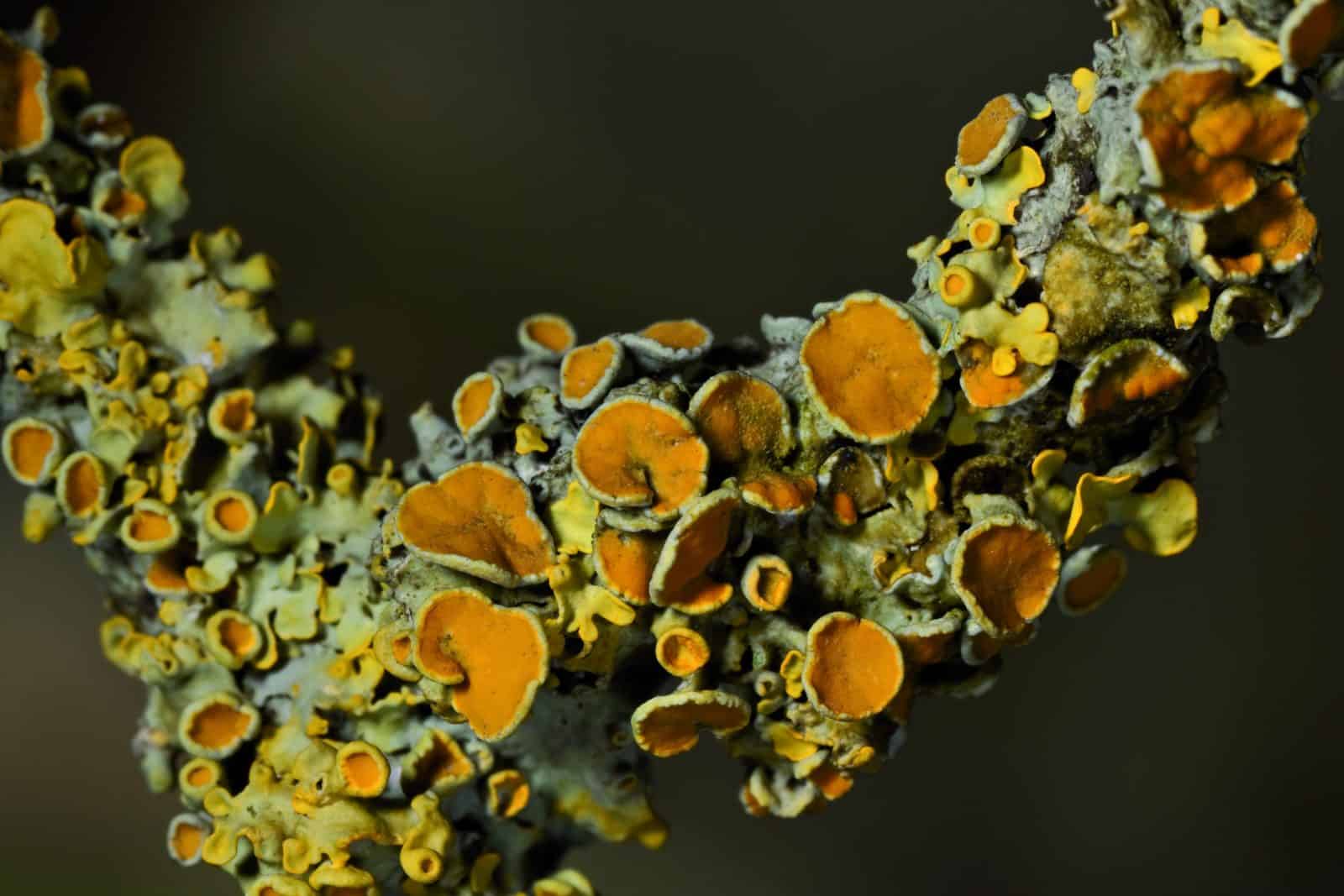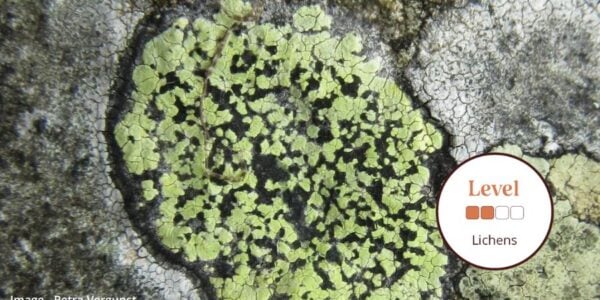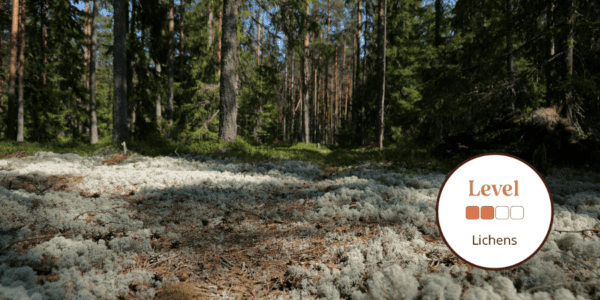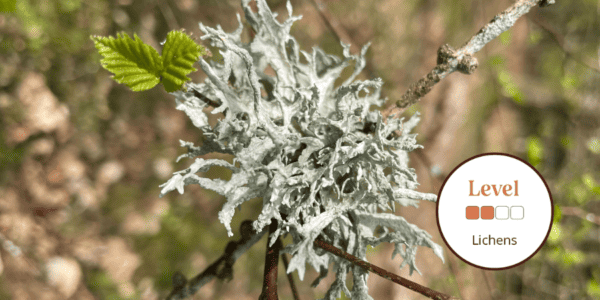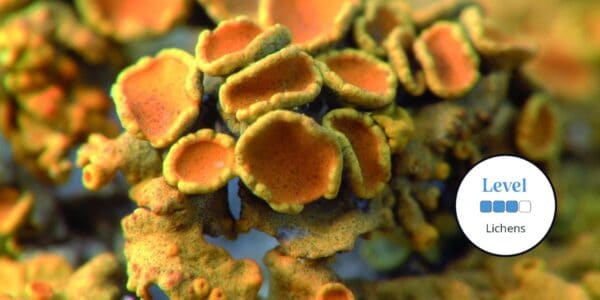This beginner lichens course will consist of a blend of field and classroom sessions to provide you with a general introduction to lichens as a group, focusing on morphology, biology, ecology and chemistry, alongside identification and recording.
Lichens are an important part of many ecosystems and can be found all around us. These are amazing small plant-like structures found on a range of surfaces ranging from rocks and boulders to buildings and the sides of trees.
The workshop will include a series of field visits to local sites around the Field Centre, situated at Slapton Ley within the South Devon Area of Outstanding Natural Beauty. With the rich lichen diversity across Devon, the Centre is perfectly situated for an introductory course to lichens, especially with the spectacular variety that can be found in the south west of England. The knowledge and skillset acquired over the duration of this course will equip you with the confidence to delve further into lichens as a group, where follow-up support is offered by the course tutor.
PLEASE NOTE the course fee is for tuition only. There is no accommodation provided with this course. If you would like to book accommodation, lunch and an evening meal at Slapton Ley please email [email protected]
Bookings will close if course capacity is reached.
Who Should Attend?
Natural history enthusiasts, students, rangers, ecologists, environmental professionals.
Knowledge Level
Beginner. Level descriptors can be found on the following web-page: Framework and Course Level Descriptors
Prior Knowledge
This beginner – early intermediate level course is open to anyone with zero or some knowledge of the subject. No prior knowledge is expected, but any knowledge will prove beneficial.
What will be covered during this course?
The course will be delivered through a combination of presentations, laboratory identification sessions and practical field work. Field work will involve visiting a range of habitats where the specimens can be identified within an ecological context.
- Defining the lichens – how their life cycle and ecology differs from other groups, with a brief introduction to their structure and function.
- Identification, description, ecology and distribution of a range of lichens.
- Particular emphasis on ecologically important groups, including those which may be bioindicators.
- How to use a lens in the field to look for characteristic structures.
- Climatological, geological and other factors which affect lichen distribution.
By the end of the course, you will be able to:
-
- Identify, and justify the identification of a selection of common lichen species using a range of identification resources.
- Evaluate the role that lichens have as ecological indicators and their use in indicating air and habitat quality.
Please email [email protected] if you have any questions.
Group Bookings Made Easy
If you have a group of 10 or more individuals wanting to complete one of our courses, our team are available to discuss your options – from discounts to private/bespoke team courses. Click here to find out more!
If we are unable reach viable numbers for this course, we will inform you of the course cancellation 14 days prior to the course run. We would recommend when purchasing accommodation and/or travel you should take out your own insurance.
Tutor: April Windle
April Windle is a naturalist with a particular interest in lichens. She is currently self-employed and involved in a variety of lichen education and conservation projects, alongside co-chairing the Education & Promotions Committee of the British Lichen Society. Her previous employment history includes Plantlife International, the Natural History Museum, Exmoor National Park Authority and the Royal Society for the Protection of Birds. LinkedIn: April Windle / Twitter: @aprilwindle
Example Timetable
Timetable
-
- Please arrive in time for the course to start promptly at 10:00 am
- The course will end at 5:00 pm.
Morning: classroom
Introduction to lichens – biology, chemistry, ecology & bioindication. Followed by lichen identification & recording, which includes:
- Demonstrations of equipment – hand lens, microscope & ID Guides.
- Concept of herbaria and reference collections.
- Thallus types/structure – crustose, foliose, fruticose & leprose etc.
- Key features – reproduction, attachment & colour etc.
- Introduction to chemical testing and safe application.
Personal time to consolidate learning and work through specimens, with tutor available to help & answer questions.Afternoon – field visit, Slapton area*Due to the limited amount of time available, this course will not cover how to complete a cross-section or use a compound microscope. Only a dissecting scope will be used as part of this workshop.
What's Included
The course has been carefully created by expert tutors and educators to help you continue to build and develop your knowledge and apply it within the field surrounded by like-minded individuals.
The course includes
- Classroom learning covering the theory of the species
- Field excursions to apply new knowledge
- Expert tuition for which the Field Studies Council is renowned
- Clear objectives and progression
You can rest assured that the absolute best content from an expert in environmental education will be provided. In choosing a Field Studies Council course, you will be joining thousands of people who learn with us each year.
Reviews
-
★★★★★
April really is a people person and was able to establish a relaxed atmosphere during the first session
-
★★★★★
April was so enthusiastic and knowledgeable. I was very happy with everything
-
★★★★☆
Being totally immersed in the subject with a group of like minded people and an excellent tutor. April and her volunteer lichen enthusiast assistants were all endlessly helpful, knowledgeable and enthusiastic about their subject . Please keep running these courses.
-
★★★★★
It was all fascinating, the course tutor was very good, the other course participants were very interesting
-
★★★★☆
The balance of field and classroom work was good and I felt I came away with sufficient tools and understanding to continue to expand my knowledge of the group. The tutor introduced the topics in a logical and steady way and followed these up with field experiences to reinforce klnowledge and understanding. A well thought through course.
-
★★★★☆
The opportunity to come and immerse myself in a subject, with the mixture of classroom sessions and field work and the evenings in the lab, is priceless.
Bursaries and Subsidies
Student Discount
This course is eligible for a student discount. If you are a current student, please use discount code BioStudent20 at checkout for 20% off all Biodiversity courses.
Before You Attend
What to Bring?
- Sturdy walking boots (ideally) or wellies.
- Good set of waterproofs (jacket & trousers) and an umbrella.
- Warm clothing (i.e. fleece, hat & gloves).
- Sun cream & clothing for cooler weather.
- Pens, notebooks and waterproof covers/plastics bags for the field.
- Phones and cameras will also prove useful for pictures.
- A day rucksack inc. lunch box, water bottle & thermos flask.
- A x10 magnification hand lens. Those costing between £3.00 - £5.00 are sufficient.
- Please bring your own refreshments & pack lunch.
Recommended Equipment & Literature
- Field Studies Council fold-out guide – Lichens on Twigs (£3.30), Lichens of heaths & moors (£3.30), Churchyard Lichens (£3.30), Rocky Shore Lichens (£.3.30) and Urban Lichens 1 & 2 (£3.30 each).
- A “Foldout Guides Wildlife Pack: Lichens” can be purchased for £17.50 inc. 6 Field Studies Council Foldout Guides.
- Frank Dobson – A Field Key to Lichens on Trees (£16.50), Coastal & Seashore (£16.50) and Churchyards (£16.50).
- Frank Dobson - Lichens: An Illustrated Guide to the British and Irish Species (£34.99).
Sorry this course booking is closed

